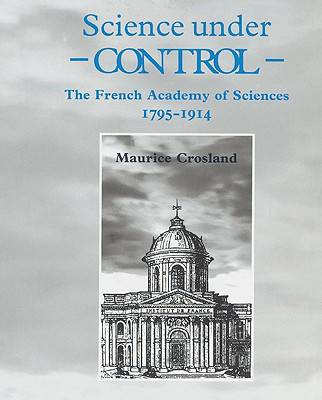
Bedankt voor het vertrouwen het afgelopen jaar! Om jou te bedanken bieden we GRATIS verzending (in België) aan op alles gedurende de hele maand januari.
- Afhalen na 1 uur in een winkel met voorraad
- In januari gratis thuislevering in België
- Ruim aanbod met 7 miljoen producten
Bedankt voor het vertrouwen het afgelopen jaar! Om jou te bedanken bieden we GRATIS verzending (in België) aan op alles gedurende de hele maand januari.
- Afhalen na 1 uur in een winkel met voorraad
- In januari gratis thuislevering in België
- Ruim aanbod met 7 miljoen producten
Zoeken
Science Under Control
The French Academy of Sciences 1795 1914
Maurice P Crosland, Maurice Crosland, Crosland Maurice
Paperback | Engels
€ 96,95
+ 193 punten
Omschrijving
The greatest ambition of any moderately successful nineteenth-century French scientist was to become a member of the Academy of Sciences. Science Under Control is the first major study in any language of this elite institution, in a period that began with such influential figures as Laplace and Cuvier and extended to the time of Louis Pasteur and Henri Poincare. The book attempts to remove the veil of mystery and misunderstanding that has shrouded this key institution and its procedures. The French government exercised political, financial, and bureaucratic control over the Academy, and the Academy in turn sat in judgment over all serious scientific production. Only with its approval could the work of French scientists win acceptance and advance their careers. The book examines the politics of science in a historical context drawing on a wealth of original historical sources. The author argues that the Academy was of importance not only nationally but also internationally, by its influence and by the establishment of certain procedures now considered basic to the organization of modern science. The book therefore provides a case study of carefully regulated scientific production encouraged yet constrained within a system of reports, prizes, and elections. This book will prove to be an invaluable source of information and of discussion on the history, politics, and religion of this intense period in European science.
Specificaties
Betrokkenen
- Auteur(s):
- Uitgeverij:
Inhoud
- Aantal bladzijden:
- 476
- Taal:
- Engels
Eigenschappen
- Productcode (EAN):
- 9780521524759
- Verschijningsdatum:
- 20/06/2002
- Uitvoering:
- Paperback
- Formaat:
- Trade paperback (VS)
- Afmetingen:
- 190 mm x 234 mm
- Gewicht:
- 816 g

Alleen bij Standaard Boekhandel
+ 193 punten op je klantenkaart van Standaard Boekhandel
Beoordelingen
We publiceren alleen reviews die voldoen aan de voorwaarden voor reviews. Bekijk onze voorwaarden voor reviews.









